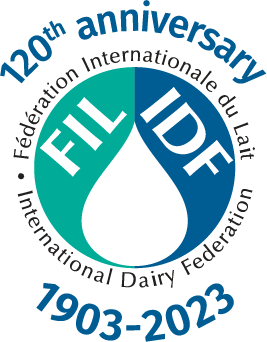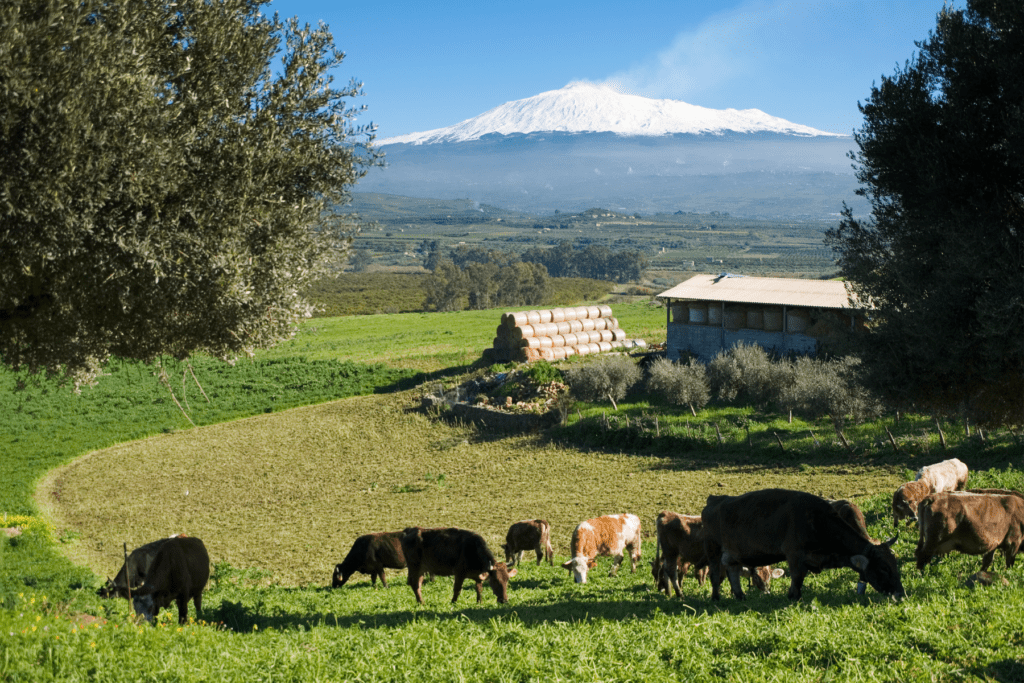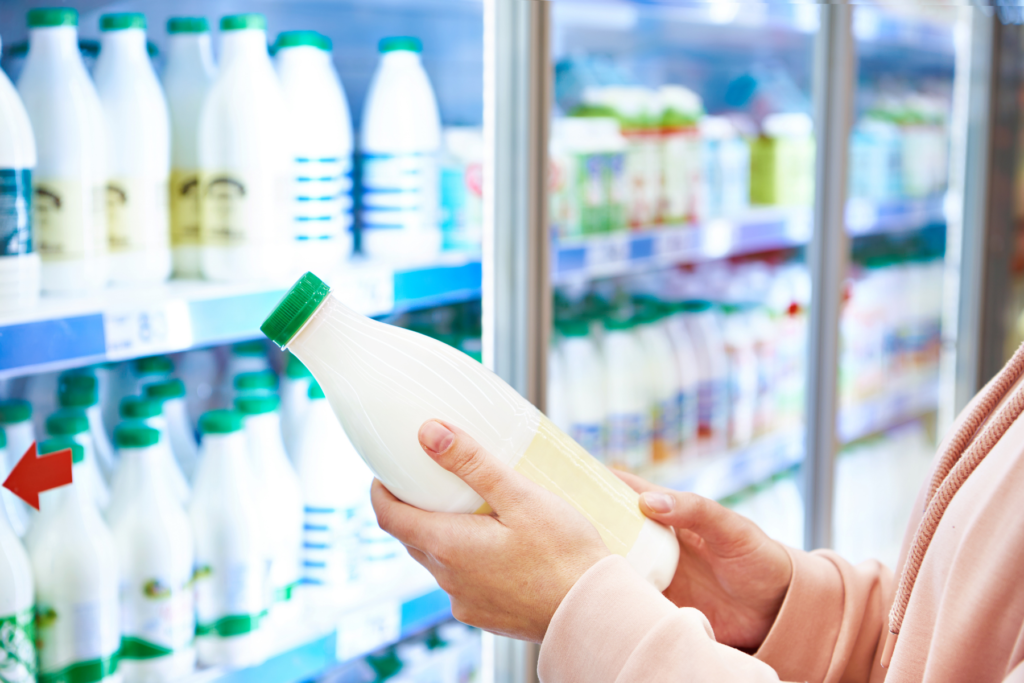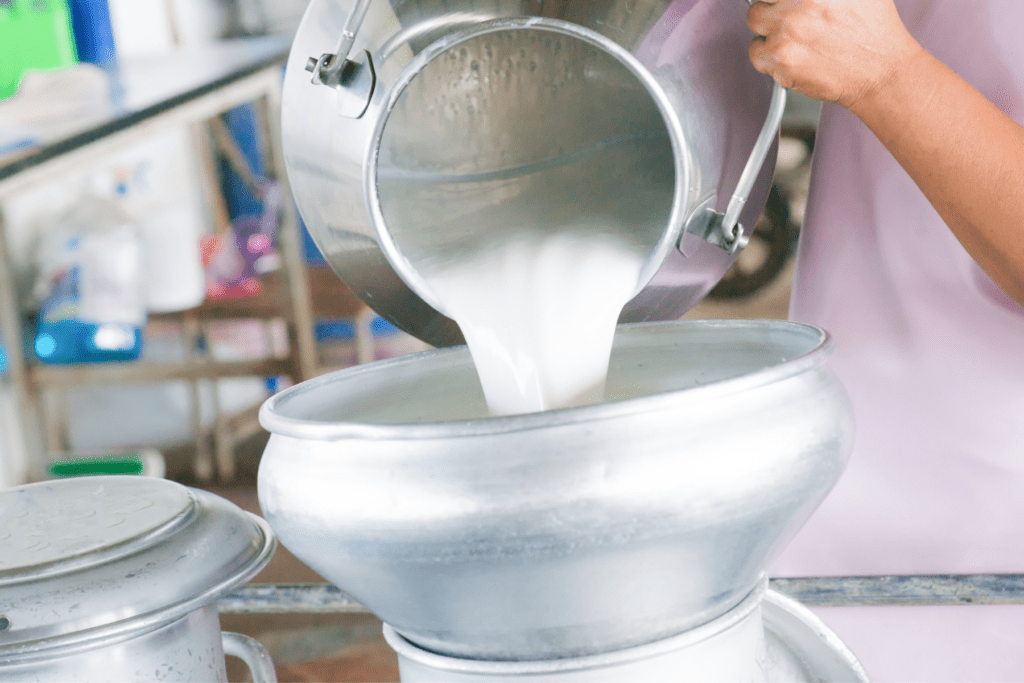The global dairy sector is taking the impact of COVID-19 extremely seriously. Please find on this page a summary of global dairy sector responses to COVID-19 and practical support. If you have any examples you would like to contribute, please contact us
Dairy sector responses to the COVID-19 crisis
- FAO publication, “Exposure of humans or animals to SARS-CoV-2 from wild, livestock, companion and aquatic animals: Qualitative exposure assessment”, now available and accessible here: (New)
PDF URL: http://www.fao.org/3/ca9959en/ca9959en.pdf
Card page: http://www.fao.org/documents/card/en/c/ca9959en
- COVID-19 Support for the dairy sector – Free digital resources on IDF Website.
- Dairy associations and processors have issued public statements for consumers on the safety measures put in place and commitment of the actors of the dairy chain.
- IDF President’s Blog March 23
- US: Ready to help farmers meet coronavirus challenges
- Canada: Canada’s Dairy Supply During COVID-19 Outbreak
- NMPF-IDFA propose a joint Milk Crisis Plan for USDA
- Guidances developed across various food/bev industry associations in the US: Screening employees for symptoms/possible exposure, What to do when employee/visitor is exposed, Physical distancing guidance and Face mask/covering guidance
- Joint Statement from the International Livestock Partnership on Covid-19
- FAO provides updates on: the emerging COVID-19 pandemic’s effects on agricultural markets, on food safety practices, consumer information about food safety and COVID-19 and the observed and potential impacts of COVID-19 on the livestock sector.
- From WHO COVID-19 and Food Safety: Guidance for Food Businesses.
- IUFoST/CIFST Extraordinary Scientific Roundtable Discussion: COVID-19 and Food Safety and its Implications, Challenges and Solutions for the Food Industry
- UK Government announces easement of competition law and its intention to work with Dairy UK and AHDB: Competition rules temporarily relaxed to allow dairy industry to work together more during coronavirus crisis
- China dairy industry response to the pandemic of Covid-19. All links at the end of the page are in Chinese.
- OIE updates: How COVID-19 is impacting animal welfare.
- IDF: COVID-19: Safety and hygiene of dairy products and personnel
- Dairy associations and/or processors have issued guidelines to their stakeholders. These include:
- France: How to reduce milk production on farm using efficient, quick and reversible solutions from Idele – French Livestock Institute (in French)
- Australia: Dairy Australia: Dairy Industry COVID-19 Directory
- UK: AHDB Coronavirus: Advice for farmers and growers
- Ireland: Lakeland Dairies protocols milk collection, suppliers, storage; COVID-19 and the Dairy Sector
- India: National Dairy Development Board has disseminated essential advisory materials to dairy federations across the country
- Italy: Links to the specific COVID19 safety protocols for employees established in Italy: Protocol 1 Protocol 2 Protocol 3
- Chile: Consorcio Lechero Recomendaciones por coronavirus para el sector lacteo
- Canada: Dairy Farmers of Canada: Information and Q&A for farmers and for consumers (also available in French), Information for Consumers on Covid-19 and Supporting Community litre by litre. (New)
- US: NMPF coronavirus resources and IDFA member update on coronavirus
- New-Zealand: Dairy NZ Message from dairy farmers to the rest of New Zealand, Advice from the Ministry of Health and some updates on the Covid-19 webpages of the World Farmers Organisation and The Federated Farmers of New Zealand
- India: The National Dairy Development Board, India has developed and shared in India guidance documents: Measures to contain the spread of the Covid-19 virus, Guidelines for prevention of Covid-19 and Ethno-veterinary medicine (EVM)
- Brazil: The impact of the Covid-19 pandemic in the dairy sector (only available in Portuguese). (New)
Other resources
- ONE welfare COVID-19 resources in English and in Spanish
- Novel Coronavirus Prevention & Control for Farms, Cornell University Agricultural Workforce Development
- Preparing the Farm for the Novel Coronavirus, Janzen Ag Law
- 5 Crisis Planning Tips to Combat COVID-19, Dairy Herd Management
- COVID-19: 5 Things Your Farm Should Do Now, Farm Journal’s PORK
- Resources Available To Address COVID-19, Dairy Herd Management
- Food Industry Resources for Coronavirus, Institute for Food Safety at Cornell University
- Dairy Defined podcast on Spotify and SoundCloud by the National Dairy Farmers Assuring Responsible Management (FARM) program
- Governments in several countries have included dairy farming, milk transport, processing and distribution as essential services during lockdown including Italy, NZ, Canada, India
- L’Interfrom Weekly Newsletter on the European and global dairy markets – 14.04.2020.
- New resource page on ILRIs expertise in zoonotic diseases.
Articles in the Press
- What dairy farmers must know about COVID-19 Hoard’s Dairyman – In English and Spanish
- COVID-19: What’s Dairy Doing? Dairy Reporter
- Coronavirus: What farmers and growers need to know – Newshub
- Covid-19: What are dairy processors doing to ‘keep the wheels turning’? Agriland
- Cornell creates detailed COVID-19 website for food industry – Cornell Uni
- Pasteurization Inactivates COVID-19 – Dairy herd
- COVID-19 Farm Resources – Centre for Dairy Excellence
- Fight COVID-19 with dairy: China industry associations issue consumption guidelines to ‘build immune resistance’ – Chinese Dairy industry to Covid 19
- WHO highlights that the Covid-19 is not a foodborne disease
- Dairy Industry Ireland media release.
AUSTRALIA – DETAILED UPDATE
The Australian Dairy Industry Council (ADIC) has convened a National Response Group to provide guidance to federal and state governments and a united voice on behalf of the Australian dairy industry. Providing a safe work environment for all workers in the dairy supply chain remains a priority for the dairy industry. In these challenging times, dairy manufacturers and farmers together with others in the supply chain have been working to keep milk flowing and on shelves without risking the health of dairy people.
A whole of industry working group has been collaborating to manage issues related to COVID-19 and is comprised of representatives from Australian Dairy Farmers (ADF), Australian Dairy Products Federation (ADPF) and Dairy Australia. As containment measures around Australia continue to escalate, governments have acknowledged that food and agriculture businesses, including dairy and all supply components, are essential services and are implementing measures to keep supply chains operating.
COVID-19 presents challenges for all agricultural sectors and the working group is responding to issues as they emerge by developing industry specific advice to support dairy businesses. Some example include:
- How to milk cows while maintaining social distancing;
- How to manage staff coming on and off farm;
- How to address supply issues that may disrupt operations for farms and factories;
- Protocols for managing milk collection; and
- Questions consumers may have regarding the safety of dairy operations.
To see the growing library of resources, visit the industry’s Dairy Industry COVID-19 Directory pages online.
Industry communications from ADF, ADPF and DA are being continually developed and executed daily. The content of the ‘Dairy Industry Covid-19 (Novel Coronavirus) Directory’ page continues to be developed, with new content available on:
- Economic stimulus relevant to dairy: ADF have prepared a comprehensive analysis of state and federal stimulus packages announced to date and collated information on the content most relevant to dairy businesses (see pages 16-17 and will be available online soon)
- Dairy Australia Technical and Innovation Manager, John Penry, highlighting resources the industry is collaborating to develop to assist your farming operation should you become impacted by Covid-19
- Social distancing for service providers – Detailed advice on how to achieve appropriate social distancing for service providers working on-farm (see page 10)
- Social distancing during milking – Detailed advice on how to achieve appropriate social distancing during milking in different dairy types (see page 9)
- Specific biosecurity considerations for Covid-19 – See online here
- Evidence about the safety of dairy foods – See pages 14-15
Information for consumers – FAQs for consumers about the comparative nutrition, usage and storage of dairy products informed by Australian search engine data and direct enquiries as part of the ‘You Ask, We Answer’ platform of dairymatters.com.au (see pages 11-13)
The focus going forward will include finalising advice for farms on how to manage with reduced labour and how to quickly and successfully skill up new labour for critical tasks including milking. Priority work in progress includes:
- Sanitisation webinar – Ian Olmstead, DA will be convening a free webinar for dairy industry participants on best-practice sanitisation to control Covid-19. More details to follow in future briefings with date and registration
- Business impact of a positive case – DA are currently developing advice on how to manage the business implications of a positive case of Covid-19 on farms or premises. The advice will be tailored to family only farms, farms with outside employees and processing operations and includes whether it is possible to self-isolate and continue to work in any
- Discouraging country travel – DA are developing messages to help industry participants discourage family, friends and wider networks from travelling to regional areas, particularly over the Easter break. This can then be promoted through industry social media channels and used in instances where tourism businesses are encouraging
- Food safety audits – seeking advice on Covid-19 impact on schedule of food safety
- Disinfectants – developing advice on suitable cleaning agents to control Covid-19.
Trade & export briefings
Dairy Australia’s Trade & Strategy team have issued a series of trade and export impact briefings. An updated briefing about the impact of Covid-19 on global dairy markets is provided at page 8 as of 25 March 2020. Dairy Australia continues to work closely to investigate technical issues associated with import and export activity. The ADIC has also written to all federal and state agriculture and health ministers for their support to ensure dairy operations across Australia remain open during escalating restrictions. DA are working with the National Farmers’ Federation (NFF) and other organisations to ensure that all agriculture and food production is protected as an essential service. ADIC Chair and ADF President Terry Richardson is available for media related to the dairy industry’s response to COVID-19.
For further information, please contact the IDF National Committee in Australia
UNITED STATES – DETAILED UPDATE
As info continues to evolve quickly, NMPF and IDFA have set up landing sites to provide accumulated info on US Covid 19 developments and guidance:
Detailed update from IDFA
The International Dairy Foods Association has been closely monitoring the COVID-19 situation to ensure the safety and availability of dairy products throughout the nation during this time of emergency. They are in close communication with members, the White House, U.S. Department of Agriculture, the Food and Drug Administration, Members of Congress, the National Governors Association, and others in the federal government to keep the supply chain free of any avoidable disruptions and to give our producers, processors and retailers as much flexibility as needed during this unprecedented time.
At present, despite significant demand on the food and beverage supply chain, IDFA members report that the nation’s dairy industry is experiencing no domestic interruptions and is continuing to supply American consumers with affordable, healthy milk and dairy products. IDFA is focused on ensuring transportation routes and supply lines in different regions of the country remain free of disruption, even if travel or access is restricted for the general public. These routes are crucial to commerce and public safety and must remain unobstructed. IDFA also reminds members that the industry must remain flexible to get products to consumers wherever they may be, including getting milk to schools and school districts that continue to provide meals to the millions of children who need them each day despite large-scale closures. Moreover, due to the dynamic nature of the COVID-19 public health crisis, there is a need to recognize and appreciate the extra efforts by the employees of companies across the entire dairy supply chain as they work to ensure our nation’s food and beverage needs are met. IDFA will continue to communication across the branches of government to advocate for the needs of members during this extraordinary time.
For relevant information and the latest updates on how COVID-19 is impacting our industry, please visit www.idfa.org/coronavirus. IDFA have established a new email address to assist our members with questions or requests for assistance from IDFA. Please send queries directly to [email protected], and staff will respond as soon as possible.
IDFA will continue to focus on making sure the U.S. government is aware of the critical needs of the food industry as the government announces new measures and guidance to the general public and the private sector. At the present, IDFA is collaborating with many other food industry trade groups to bring the following issues and concerns to the Administration for action and consideration:
- Continuity of waste management services, especially if provided by local government or third parties; energy and utilities services; and telecommunications and internet
- For trucking and rail service, ensuring inbound and outbound transportation routes are not impeded due to containment or quarantines; ensuring local municipalities lift any potential delivery curfews so trucks and rail can deliver when possible
- Keeping ports open and functional for exports to avoid products backing up in the system and for critical delivery of inputs to food production facilities
- Ensuring border inspection facilities (Canada and Mexico) prioritize entry of foodstuffs and have mechanisms in place to allow drivers and vehicles expedited screening and entry
- Maintaining all critical infrastructure, especially if those services are critical to food production and distribution
- Ensuring food production facilities have access to inputs including ingredients, cleaning and sanitizing products, normal food safety testing products, and packaging supplies
- Having an actionable, responsible plan in place to ensure workforce continue to have access to food production and distribution facilities if travel or access become restricted
- A commitment from the federal government that they will provide enough inspectors and other government officials who are essential to the production or movement of food
- Having an actionable, responsible plan in place to standardize safety of operations in production facilities
- Providing food manufacturers and distributors with priority access to refrigerated containers and trailers and pallets
IDFA has a dedicated webpage on COVID-19, including key updates on US governmental actions, guidance and other information:
https://www.idfa.org/coronavirus
Also of relevance: Department of Labor guidance on preparing workplaces for COVID– https://www.osha.gov/Publications/OSHA3990.pdf
For further information, please contact the IDF National Committee in US
DAIRY INDUSTRY IRELAND: An Ibec Campaign
Supporting the Irish dairy and specialised nutrition sector
The impact of the crisis on the Irish dairy and specialised nutrition sector
The primary dairy sector is worth €11.3 billion annually to the Irish economy. DII commissioned EY to conduct an examination on dairy and COVID-19. It found that Irish dairy processors export 92% of all produced products and that three quarters of Irish dairy is exported to the top 15 countries most effected with COVID-19. The spread of COVID-19 has had a dramatic impact on international dairy markets. Product destined for foodservice customers is now flooding into other production areas such as powders and butter. Near term output from the industry could fall by as much as €2.3 billion in value as a result of falling demand and potential losses in processing capacity. Read more











